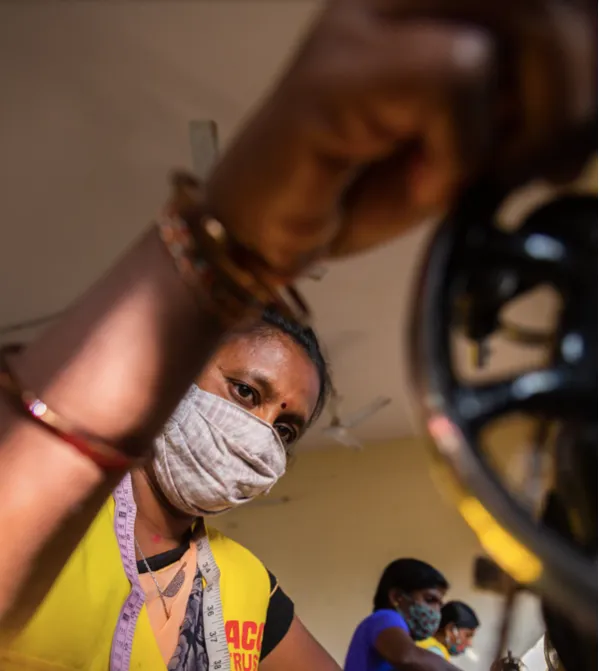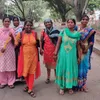The importance of collectives in helping women become first-time entrepreneurs
How a few key partners and other elements helped Head Held High Foundation launch women collectives in several rural districts. And what makes this model so effective in empowering the women who are part of it.
At a community centre in Wadi, a small town in Karnataka’s Gulbarga district, a group of women were huddled over their project. They were working on hand embroidering a set of white kurtis for Stitch in Time, a textile initiative focused on reviving and promoting heritage craft techniques.
The Wadi centre is a small but solid testament to the power of group enterprise and motivation. It is one of four centres under Head Held High Foundation’s rural entrepreneurship programme – aptly called Antarprerna – that is run with support from ACC Trust. The other centres are located in Chandrapur (Maharashtra), Chikkaballapur (also in Karnataka) and Madukkarai (Tamil Nadu). As the CSR wing of ACC Cement, ACC Trust has thrown its weight behind these projects, stepping in to provide space as well as the equipment needed – in this case, a set of sturdy sewing machines – for the women to start work.

The Head Held High team had to persuade family members of the benefits and overcome the reservations of the women, many of whom had never stepped out of their homes for work.
Together, these collectives have helped close to 200 women become first-time earners, generating more than Rs 1 million in income between them. Along the way, the women have developed greater confidence, improved their craftsmanship, and honed their entrepreneurial skills.
The road to achieving these results has included both bumps and bright spots. When the pilot project was launched in Wadi in 2019, just recruiting the initial batch of women was a difficult proposition in a place where women rarely, if ever, step out of their homes for work. The Head Held High team had to persuade family members of the benefits and overcome the reservations of the women themselves before the project could get off the ground.
A trainer, Devaki, was recruited from a nearby village to guide the women through different kinds of sewing tasks – from basic bags to more intricate items.
The trainer’s role is key in a collective set up for group enterprise. She has to single handedly manage the team of women and also keep them motivated and productive. Devaki has battled a great deal of adversity, having lost her husband in a work accident more than a decade ago. But with a naturally upbeat temperament, she stepped in to be both a coach and cheerleader for the women as they tentatively took their first steps towards financial independence.
She believes that the experience has positively impacted her in equal measure and says that working at the centre brings new learning every day. Most importantly for her and the other women, it’s a safe and secure workplace.
“However, training and work readiness are not the only ingredients needed to make a women collective tick,” says Anusha Saxena, Program Manager for the Antarprerna initiative. She says that in addition to a partner to cover the expenses, market linkages are an essential part of the formula. In Wadi, the first market partner to sign on was Meemansa, a company that upcycles fabric waste (called dead stock) into various textile products.
Their goal is to reduce waste while providing employment for women in rural locations. Before long, the women in Wadi were filling Meemansa’s orders for cloth bags. Other market partners have since signed on, drawn to the idea of producing while simultaneously enabling rural livelihoods. These include textile entrepreneur Deepa Chikarmane who started the Stitch in Time initiative and the Craftizen Foundation, a craft-based skilling organisation.
Financial empowerment – on average, the women make Rs 2,000 a month – has also enabled a mindset shift for the women and those around them. The stories of change keep streaming in from across the projects. A single woman who found that she could now afford to put her young niece through school. Another woman who had walked out of an abusive marriage and now gets due respect from those around her. These and other stories point to a new sense of agency in the women.
The project has even managed to navigate COVID-19 lockdowns. When the centres had to be shut down during these periods, the women worked from home to make masks commissioned by various partners. In addition to ACC Trust, this list also includes Hindustan Unilever, Craftizen Foundation and a few local buyers. The Head Held High team uses a milk run model during such times – dropping off fabric and other supplies for the women and then picking up the finished products later for distribution.
This strategy has worked very well. Last year, the women made more than 35,000 masks during the lockdown. This year, they are looking at filling more than 60,000 mask orders by the time COVID-19 restrictions are lifted.
But a big part of bringing women together to work in a collective is to eventually help them spread their wings and fly as individual entrepreneurs. With that goal in mind, all the women in the projects go through a rigorous entrepreneurship orientation, geared towards developing the mindset and skills needed to launch and run a business.
In Wadi, a few of the women from the pilot batch are now looking at starting small ventures aimed at the local community. These are primarily home-based food ventures involving local favorites like jowar rotis and chikkis. Some women are also exploring clothing reselling and producing small household items for sale. At first tentative about taking the plunge, the women are now excited about their prospects based on the initial response to their products.
The results from the Antarprerna projects so far point to the model’s potential to empower many more rural women in communities like Wadi. In a collective, transformation also tends to be accelerated. In a recent paper on what makes women’s empowerment collectives so effective, Katherine Hay of the Gates Foundation writes:
“[Women’s] empowerment collectives, are based on a fundamental truth: When women come together, they all become stronger. This is especially true for women in low-income households. These women find power in pooling resources, sharing risks, and using their collective strength to negotiate the deep-rooted social and cultural barriers within families and communities.”
In the months ahead, collectives like the Antarprerna projects and the entrepreneurial activities they drive, may become key to building resilience in many COVID-hit rural communities across the country.
Edited by Diya Koshy George







